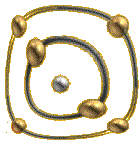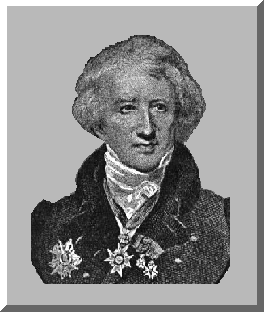AwayMave Home Page | IEPPP Home Page | 406 Module Home Page | University Home Page | VP Home Page

Reason, nature and the human being in the West: Part 5
The 19th Century
AwayMave Home Page | IEPPP Home Page | 406 Module Home Page | University Home Page | VP Home Page |
||
 |
||
Reason, nature and the human being in the West: Part 5The 19th Century |
||
5.1 The Organism |
|
|
| |
|
|
The great event for the study of animals and plants of the 19th Century was the emergence of life. The theory of evolution introduced a new perspective on the human being, and on society, while our arrangements for living together received a different kind of attention in the work of Marx, those he drew on and those he inspired. |
|
Web stuff A website designed to survey the relationships between literary works and natural history in the century before Charles Darwin's On the Origin of Species (1859) The Internet History of Science Sourcebook has pointers to important primary texts and also some secondary material. |
The new concept through which living things (as we call them today) were understood in the 19th Century was the organism, and in the analysis developed with great power by Michel Foucault, it was the French scientist Georges Cuvier who made the decisive break with the 18th Century framework, accomplishing the eponymous Cuvierian revolution.
The organism: a complex of chemical processes, organised into a hierarchy of systems and sub-systems, interacting with each other in such a way as to maintain the integrity of the whole.
If you shift your focus from seeing the animal like a bird-watcher (and especially a twitcher) sees birds - as items whose interest is essentially in their discernible appearance and behaviour - to thinking of it as a working system, you have undergone the Cuvierian revolution.
See Reading from Foucault, The Order of Things, UK edition London 1970, Tavistock, pp. 263-279.
What can I mean by "working system"?
 |
| Georges Léopole Chrétien Frédéric Dagobert, Baron Cuvier (1769-1832) Thanks to UCMP, who have a useful introduction.
|
It is the idea of a complex thing, with lots of internal organisation - not just a blob - where the internal organisation is such as to make the whole thing hang together and go on hanging together.
A running car has this kind of internal organization. It has lots of parts, and they need to mesh together if the whole machine is to keep running. If it is petrol based, there will need to be cylinders with pistons in them and spark plugs, and the spark plugs will have to spark at just the right moment in relation to the movement of the pistons etc.
For an organism, failing to hang together is death, the disintegration of the organism. The internal organization of the component parts is such as to keep the integration going - to keep the entity going as a unity.
Living things, post Cuvier, are things with this kind of internal organization. There are a number of components parts, and they interact in such a way as to maintain their configuration.
Components need to support each other in this way because if they didn't they would fall apart. The living state, the state of continuing integration of the components, is unstable. It needs activity to keep it going. If a high degree of mutual support between the parts was not maintained, they would fall into a heap: and processes of decay would secure their thorough dispersion.
|
Oversimplified example: Eg you need a connected set of organs to get food, extract energy from food and distribute that energy if any one of them is to work. If you have inside an animal a 'component' capable of extracting energy and usable material for growth and repair - a digestive system, say - then you also need the support of a suitable interface between that and the outside source of raw material. And you need a mouth, perhaps, and legs to chase prey etc. And you need an interface linking the energy extracted and the areas in the body which actually need to consume it: a blood circulation system, for example, taking sugar from its site of extraction round the rest of the body. To say this is to subject the organism to functional analysis : you say it is made up of parts, each of which perform a function in the working of the whole, in keeping the whole going. |
Notice that the easy phrase "keeping the whole going" brings in very quietly the notion of the whole having a goal. The parts can only have functions if the whole to which they belong has a goal. The goal can be simple, like just staying in one piece: staying integrated, staying alive.
Notice that buried here too is the idea of a basic opposition between life and not life: not life is the state to which things in the universe tend, except where very special configurations of elements come together and achieve an island of organization capable of preserving itself for a time from disintegration.
|
Summary: The new conception of the living thing: a very special configuration of components capable through mutual support of keeping disintegration temporarily at bay. |
Implications of the new concept of the organismThis new conception of the living thing has a number of major implications: 1. The idea of a limited number of plans. The conclusion that that are a limited number of basic configurations open to things that aspire to life - the 'archetype' idea. This is the thesis that not any old assemblage of parts will work: there are probably a very limited number of solutions to the "engineering" problem of designing a system that is unstable and yet capable of maintaining itself in its unstable state. (At any one time there are a limited number of basic blueprints for a motor car.) There's a supplementary note on this. 2. A new concept of life. - I explore this a little below 3. A new concept of function - one that de-emphasizes the identification of organs in terms of physical description. There's also a (tiny) supplementary note on this. 4. A new concept of the human 'self'. A gnomic way in here. (4. A new approach to classification.) There's just a side note on this. |
I deal here with the most germane of these, the new concept of life.
Revised 30:03:04
IEPPP 406 Part 5 Home Page
IEPPP 406 Home Page
Reason, Nature and the Human Being in the West
Part of a module of the MA
in Values and the Environment Lancaster University
Send Mail to the Philosophy
Department